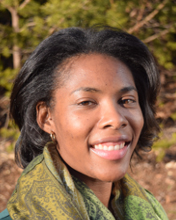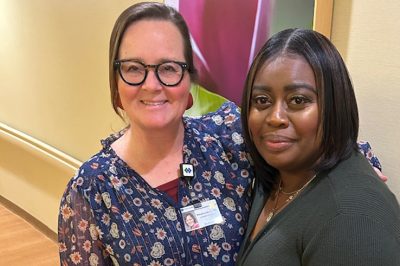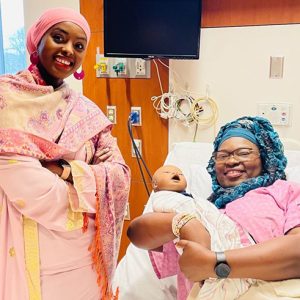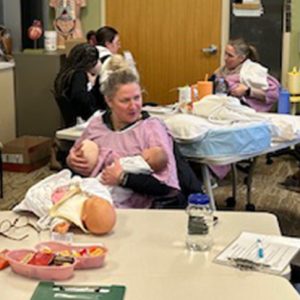EMPower Best Practices supports breastfeeding equity at the Family Birth Center
March 28, 2024
“Brooke really calmed my fears about being able to keep up,” said Steph Lacey, RN, IBCLC, a Lactation Consultant at the Family Birth Center at Methodist Hospital in St. Louis Park, Minnesota.
A year and a half ago, Brooke Gilliam, BSN, RN, IBCLC, a Social Clinical Research Specialist/Breastfeeding Coach with the Carolina Global Breastfeeding Institute’s Healthcare team working on the CDC’s EMPower Best Practices program, started working with Steph, the team lead and trainer for her hospital.
The Family Birth Center births more than 3,000 babies yearly. There are ten lactation consultants on the staff.
Focusing on the Fundamentals

Brooke Gilliam
EMPower Best Practices provides training to trainers in approximately 125 birthing facilities across the nation by focusing on Step 2 — of the Ten Steps to Successful Breastfeeding — of the Baby-Friendly Hospital Initiative (BFHI). Baby Friendly USA (BFUSA), the non-governmental organization that oversees BFHI in the United States, updated their guidelines and criteria for Step 2, which went into effect in 2023. Step 2 focuses on competency-based training of maternity staff providing service to birthing families. “Our training is in alignment with those new requirements,” said Brooke. “We achieve this by helping facilities implement resources provided to train all labor and delivery, postpartum, and newborn nursing staff.”
In the beginning phase of the project Brooke and Steph met monthly via Zoom to discuss training and education for the Family Birth Center team on the fundamentals of equitable care, data collection and skills training implementation. They talked about common challenges faced by facilities, including resistance to change, staffing, and data limitations.
In addition, the EMPower Best Practices program provides each facility with online educational modules, a training plan, learner workbook, measures tools to track data, and skills-training resources.
Every other month, Steph also attends the Equity Community of Practice calls lead by the EMPower Best Practices team and Abt Associates. These calls dig deeper into what it means to have an equity champion on your team. “The equity community of practice calls are optional, but she’s taking that extra step,” said Brooke. “That’s a huge win for Steph’s hospital because she’s getting extra resources to help drive diversity and equity-based concepts that will benefit her staff and patients.”
Empowering through Equity
Each team is encouraged to use an equity lens to look at the relationship between themselves and their patients. For example, some facilities have a heavy Spanish-speaking population, but their entire team is white and no one speaks Spanish.

(l to r) Steph Lacey and Chantae Gills-Grandsberry
“We like EMPower Best Practices more than the training program our nurses used previously,” said Steph. “Our team especially likes the part around the equity portion and recognizing bias with the workbook and videos.”
“I agree,” said Nurse Manager Chantae Gills-Grandsberry, BSN, RN, who works with Steph at the Family Birth Center. “They’re actually enjoying learning on their own time. And, when they’re on the floor, they can focus and reflect more. When we do have them come into the actual class, we’re more prepared, a little more open with mind and heart to hear what we’re going to face. I think it’s been all positive so far.”
Connecting with the Community
The Family Birth Center works with their organizations simulation center that offers a deep community connection. Combined with EMPower Best Practices tools, the Family Birth Center team can set up scenarios based on actual people from their community.

Simulation “actors” (l to r) Shukri Jumale and Yaa Konadu Nti
EMPower Best Practices encourages hospitals to take what they see in their setting — patients who need lactation support or are having breastfeeding-related questions — and put it into a case study. “For example: Do you call for an interpreter? How do you explain to the birthing parent how to position baby? How do you educate and assist with latching baby? How do you go over hand expression?” said Brooke. “As facilities are designing their skills training event we provide them with diverse case scenarios. We encourage facilities to get creative and adapt the scenarios to reflect their patient population, recall unique or common cases seen within their department and use these to make the learning experience real for staff.”
The Family Birth Center serves a sizable Somali population. Steph, Chantae, and their colleague Karissa Nguyen helped create a breastfeeding scenario with two Somali nurse leaders in the community. Using filmed footage and community members, the center’s team got a chance to evaluate biases and stereotypes in the simulation.
Afterward, they debriefed and discussed the scenario for about an hour. “We can have more deeper, meaningful conversations other than just a quick check-in kind of thing. We try to ask open-ended questions to get people thinking and talking,” said Steph. “That’s been the best part for us.”
Breaking through Barriers
“Data plays an important role in understanding of the community by identifying barriers that a particular group may be experiencing. Hospitals were challenged to not only look at their overall numbers, but to take it a step further and look at their data by race and ethnicity. This allows hospitals to uncover disparities that would be otherwise masked by looking at only the overall numbers,” said Brooke. “Steph not only met the challenge, but she identified a group of people in the community who’s breastfeeding rates would have gone unnoticed if she didn’t look at the data this way. She is currently looking at ways to support and meet the needs of these families to ensure they get the chance for optimal breastfeeding.”

Team skills session
In another simulation that touches on the assumptions and stereotypes surrounding mothers of color, Chantae said, “The major benefit would be helping us to talk about some of the biases that staff can have when dealing with mothers of color, showcasing how easy it can happen and that we don’t even realize we’re taking part.”
Both Steph and Chantae feel that EMPower Best Practices takes the focus of their work off checking boxes. By being more mindful of their patients and their families, it’s easier to be sensitive to their feelings and experiences. Everyone deserves the same level of care.
With ten simulations completed, the Family Birthing Center team has noticed changes. “We can measure that our rates of exclusive breastfeeding are going up,” said Steph. “And, that is telling us that perhaps some people are getting more education and making a choice to exclusively breastfeed.”
Robert A. Poarch
